(House of Bhakti) – Divisions of devotion
The following is a transcription of a discourse delivered by Śrīla Bhaktivedānta Nārāyaṇa Mahārāja in Volgograd, Russia, on September 15, 2004
(Ever since parama-pūjyapāda Śrīla Bhaktivedānta Nārāyaṇa Mahārāja began his Western preaching tours in 1996, he has been regularly discussing the five kinds of pure devotees. His visit to Russia this year was no exception. Soon after returning from Russia, Śrīla Bhaktivedānta Nārāyaṇa Mahārāja had a five-day program in Noida [near Delhi], wherein over three thousand people attended each night, and this was the topic of his classes there as well.)
For the last two days, we have been discussing uttama-bhakti and explained that there are some lower classes of bhakti. Now, with examples, I want to touch on all the stages of bhakti. Bhakti has five stages or divisions. There are millions of divisions of devotees, but among them, five are prominent – the jñānī-bhakta, śuddha-bhakta, premī-bhakta, premapara-bhakta and premātura-bhakta.
You may know the history of Dhruva Mahārāja. Dhruva Mahārāja had darśana of Lord Nārāyaṇa in only six 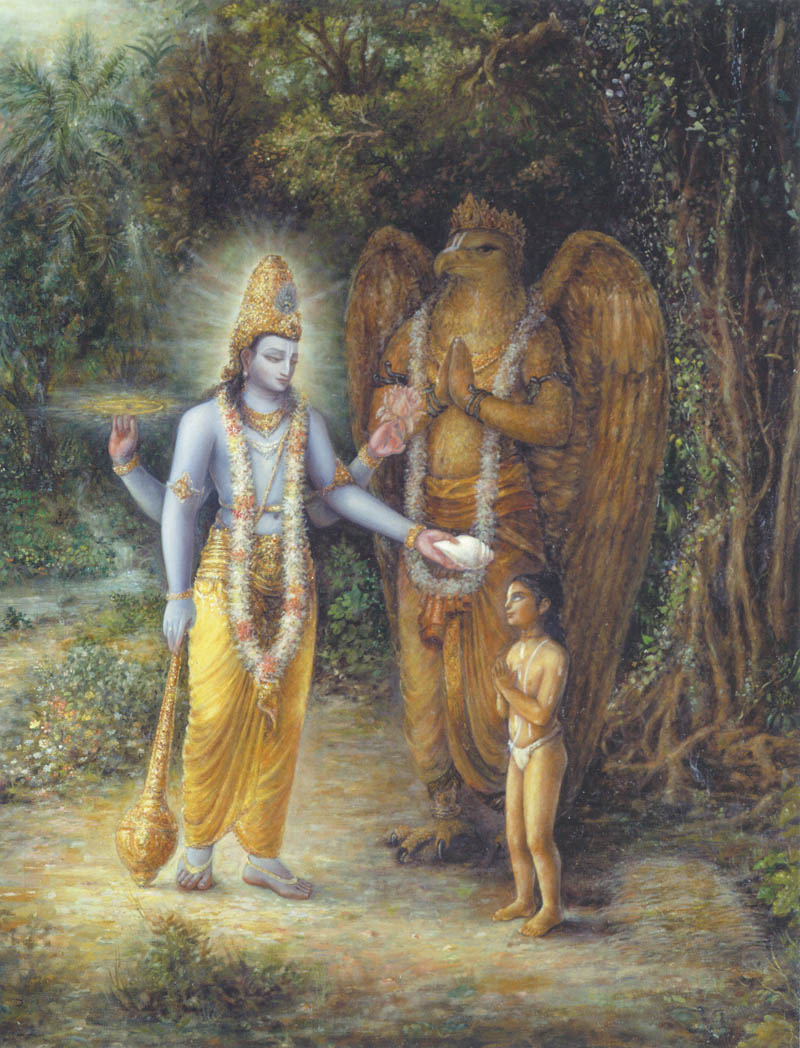 months – by chanting the mantra “Oṁ namo bhagavate vāsudevāya”, given by Śrī Nārada Ṛṣi. Still, his bhakti is not called pure uttama-bhakti. He performed very severe austerities to please Lord Nārāyaṇa. He rejected food, water and even air. In six months, he entered samādhi and saw Lord Nārāyaṇa, who was carrying the wheel, conch, lotus and club. Yet, his bhakti was not pure because he had worldly desires (anyābhilāṣa). In his natural position, he desired immense wealth and a kingdom even greater than his father’s, who ruled the world.
months – by chanting the mantra “Oṁ namo bhagavate vāsudevāya”, given by Śrī Nārada Ṛṣi. Still, his bhakti is not called pure uttama-bhakti. He performed very severe austerities to please Lord Nārāyaṇa. He rejected food, water and even air. In six months, he entered samādhi and saw Lord Nārāyaṇa, who was carrying the wheel, conch, lotus and club. Yet, his bhakti was not pure because he had worldly desires (anyābhilāṣa). In his natural position, he desired immense wealth and a kingdom even greater than his father’s, who ruled the world.
Lord Kṛṣṇa was so merciful that Dhruva Mahārāja received not only his father’s kingdom but the kingdom of the whole universe for 36,000 years. Still, he lamented after meeting with Lord Nārāyaṇa. He considered, “I was searching for some jewels or gold, and by luck, I received a cintāmaṇi (desire stone) – but I threw it out.” He lamented that he had not told the Lord, “I want your bhakti” – not vraja-bhakti, or bhakti of Nārāyaṇa, or any bhakti.
Many believe they have attained the stage of rāgānuga-bhakti, but if any worldly desire is there, that is not even pure vaidhī-bhakti. It is rare to [find someone who can] honestly say, “I am a rāgānuga-vaiṣṇava.” We can, of course, very quickly say this with thousands of mouths, but we should examine our hearts to see if even a touch of worldly desire is present in our natural position.
Dhruva Mahārāja’s bhakti is rejected as being in the category of pure devotion. It may be after that he had the association of Śrī Nārada Gosvāmī and taken the darśana of Nārāyaṇa, so it may be that his desire vanished, but there is no proof of this – it is not written anywhere. He still had the desire to take his mother with him to Vaikuṇṭha. His [bhakti] is not uttama-bhakti. His [bhakti] was karma-miśra bhakti with anyābhilāṣa (worldly desire). Therefore, we don’t want it.
The first category of devotees in the five kinds of pure devotion is Prahlāda Mahārāja, who is a jñānī-bhakta. 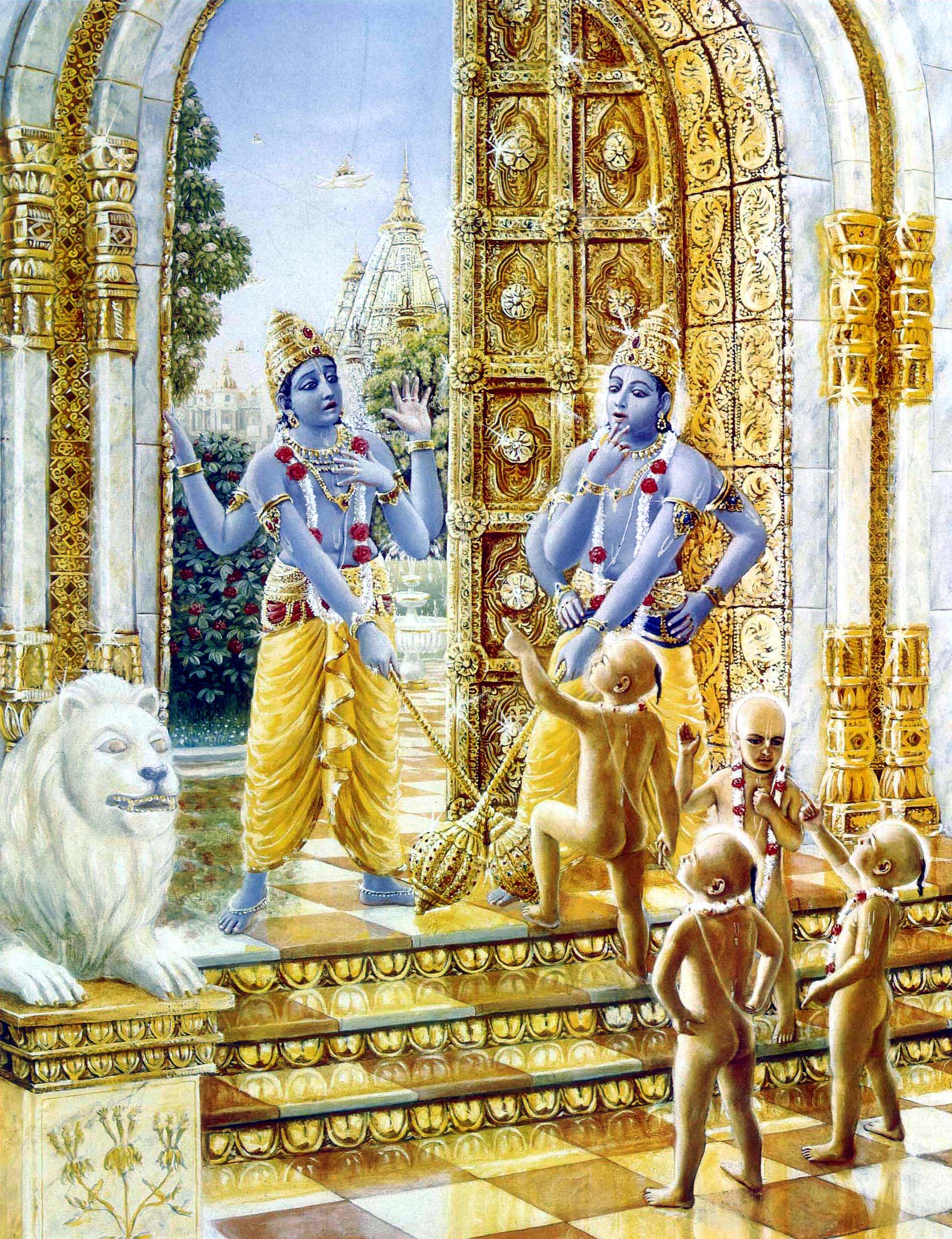 Sanaka, Sananda, Sanātana and Sanat-kumāra, in their first stage, were jñānī-bhaktas, and Grandfather Bhīṣma was also a jñānī-bhakta. It is not easy to be like them. They were bhaktas, not voidists or impersonalists (nirviśeṣa–vādīs). They didn’t follow Śaṅkarācārya’s theory. They never said, “I am Brahma – I am that Supreme Impersonal Being.” They were aware that Lord Kṛṣṇa is Parabrahma, the Supreme Personality of Godhead. There is a strong conception (jñāna) of the opulence of Kṛṣṇa in their hearts, so they are jñānī-bhaktas. The four Kumāras were even speakers of aṣṭa-kālīya-līlā. Bhīṣma Pitāmaha is a very exalted devotee and is one of the twelve mahājanas, but he is not a śuddha-bhakta in the sense that he cannot render direct personal service.
Sanaka, Sananda, Sanātana and Sanat-kumāra, in their first stage, were jñānī-bhaktas, and Grandfather Bhīṣma was also a jñānī-bhakta. It is not easy to be like them. They were bhaktas, not voidists or impersonalists (nirviśeṣa–vādīs). They didn’t follow Śaṅkarācārya’s theory. They never said, “I am Brahma – I am that Supreme Impersonal Being.” They were aware that Lord Kṛṣṇa is Parabrahma, the Supreme Personality of Godhead. There is a strong conception (jñāna) of the opulence of Kṛṣṇa in their hearts, so they are jñānī-bhaktas. The four Kumāras were even speakers of aṣṭa-kālīya-līlā. Bhīṣma Pitāmaha is a very exalted devotee and is one of the twelve mahājanas, but he is not a śuddha-bhakta in the sense that he cannot render direct personal service.
Prahlāda Mahārāja meditated on Lord Kṛṣṇa. Bhīṣmadeva can meditate, and the four Kumāras can also meditate. But they consider that their Lord is never hungry, has no thirst, and never gets tired – so there is no need to massage him, for example – as Hanumān massages Lord Rāma. They never render personal service.
Pure bhakti is “ānukūlyena kṛṣṇānu-śīlanaṁ”. There must be some service. A pure devotee will serve his Lord. But jñānī-bhaktas have nothing to do because they always think, “He is our saviour, protector, and worshipable Lord.”
Now we will explain how Prahlāda Mahārāja is a jñānī-bhakta. He had no worldly desires. Lord Nṛsiṁhadeva 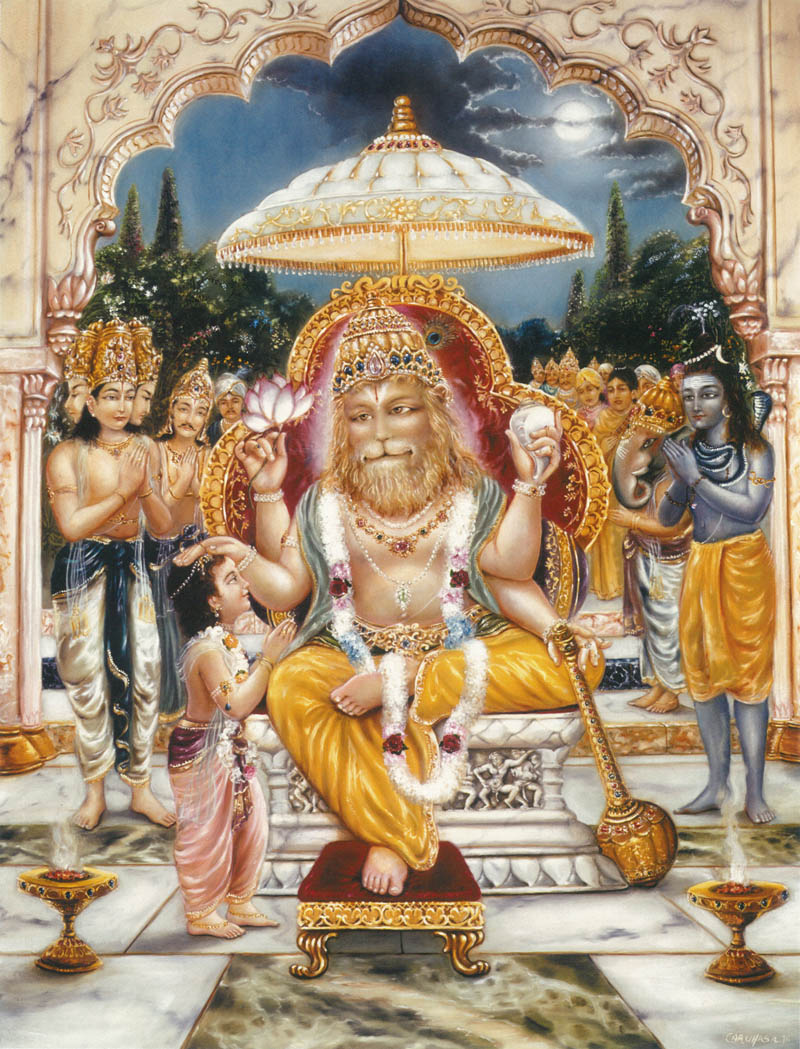 appeared to him and said, “You may ask any boon from me.”
appeared to him and said, “You may ask any boon from me.”
Prahlāda Mahārāja replied, “I am not a business person. If I have any worldly desire, please take it away.” Lord Nṛsiṁhadeva insisted, “You must choose a boon.” Prahlāda Mahārāja wanted his father to be liberated, and he also requested, “I want all non-devotees in this world to be free from the endless pain of birth and death and be liberated; and in turn, I will suffer for them.” Lord Nṛsiṁhadeva wept and thought, “What a glorious devotee!”
Prahlāda Mahārāja is a pure devotee. His jñāna does not mean nirviśeṣa–jñāna – the misconception that the ultimate truth is impersonal. Rather, his jñāna is aiśvarya-jñāna. We see here that there is not so much mamatā (possessiveness) towards the Lord and no service because of knowledge of the Lord’s opulence. You can read the pastimes of Lord Nṛsiṁhadeva and Prahlāda Mahārāja in Śrīmad-Bhāgavatam if you want to know more.
Next is Ambarīṣa Mahārāja, who was a śuddha-bhakta. Ambarīṣa Mahārāja was a sādhaka. Prahlāda Mahārāja 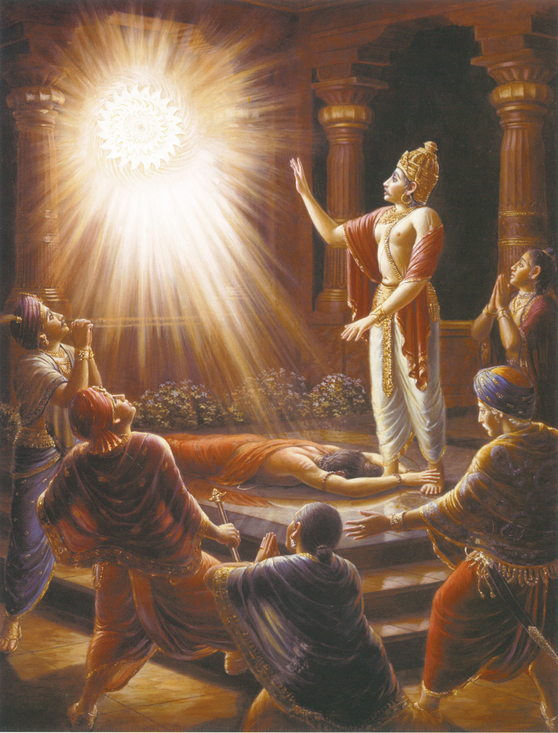 was liberated, and yet Ambarīṣa Mahārāja’s bhakti was superior to that of Prahlāda in some sense – because he was actively engaged in serving Lord Kṛṣṇa. He stayed in Vṛndāvana for some time, doing parikramā of Vraja-maṇḍala – Keśī-ghāṭa, Vaṁśī-vata, Rāsa-sthalī, Nandagaon and Varṣāṇā. He even used to go to Rādhā-kuṇḍa and Śyāma-kuṇḍa. Although he was a sādhaka, he had a special mamatā for Kṛṣṇa, the beloved of the gopīs. Prahlāda Mahārāja has never been to Vṛndāvana. Sanaka, Sanandana and the other Kumāra brothers were in Haridvāra. So Ambarīṣa Mahārāja was very fortunate.
was liberated, and yet Ambarīṣa Mahārāja’s bhakti was superior to that of Prahlāda in some sense – because he was actively engaged in serving Lord Kṛṣṇa. He stayed in Vṛndāvana for some time, doing parikramā of Vraja-maṇḍala – Keśī-ghāṭa, Vaṁśī-vata, Rāsa-sthalī, Nandagaon and Varṣāṇā. He even used to go to Rādhā-kuṇḍa and Śyāma-kuṇḍa. Although he was a sādhaka, he had a special mamatā for Kṛṣṇa, the beloved of the gopīs. Prahlāda Mahārāja has never been to Vṛndāvana. Sanaka, Sanandana and the other Kumāra brothers were in Haridvāra. So Ambarīṣa Mahārāja was very fortunate.
Superior to Ambarīṣa Mahārāja is Hanumān. Hanumān is a premī-bhakta. He is liberated and serving Rāma and has so much mamatā for Him. He discovered Sītā in Laṅkā, and he carried Rāma on his shoulders. Ambarīṣa Mahārāja could not do so. Ambarīṣa Mahārāja was thinking of serving — in other words, he was serving with his internally conceived spiritual form within, but externally, he was in the body of a sādhaka (practitioner), which could serve the deity but not the Lord in His pastimes. On the other hand, Hanumān was serving Rāma with his body.
Hanumān serves Rāma in all respects. Some knowledge of Rāma’s opulence is present in his heart, but rarely. 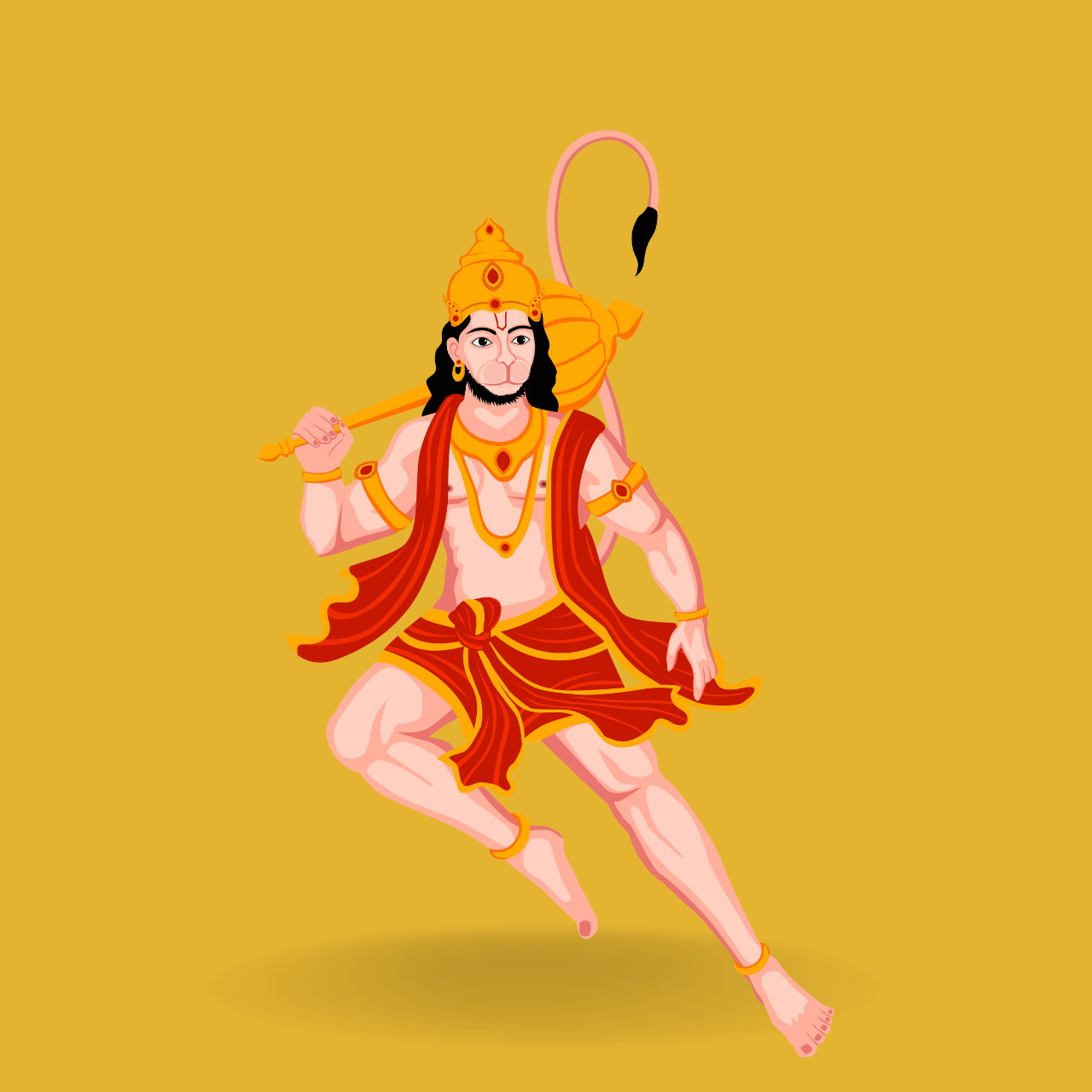 Hanumān has aiśvarya-jñāna, but not always. He would bring many fruits from the forest because he considered his Lord to be sometimes hungry. When Rāvaṇa stole Sītā, Hanumān jumped over the ocean and found her. He also burnt Laṅkā and returned to Rāma. He thought, “I am qualified to kill Rāvaṇa, but I desire that Lord Rāma kill him.” He wanted to take Sītā on his back and bring her to Rāma, but she refused to do so and said, “Rāma should come and finish this entire dynasty of demons.”
Hanumān has aiśvarya-jñāna, but not always. He would bring many fruits from the forest because he considered his Lord to be sometimes hungry. When Rāvaṇa stole Sītā, Hanumān jumped over the ocean and found her. He also burnt Laṅkā and returned to Rāma. He thought, “I am qualified to kill Rāvaṇa, but I desire that Lord Rāma kill him.” He wanted to take Sītā on his back and bring her to Rāma, but she refused to do so and said, “Rāma should come and finish this entire dynasty of demons.”
The Pāṇḍavas are still more superior. They are called prema-para bhaktas. Hanumān can carry Rāma and Lakṣmaṇa on his shoulders, but he cannot sit on their shoulders. He cannot give his food remnants to Rāma, thinking, “Oh, this is very sweet. Let me give some to Rāma.” He fears to do so because knowledge of Rāma’s opulence is somewhat present. Opulence is somewhat of an obstacle, so although he is a very high devotee, there is some obstruction in his flow of devotion.
Lord Rāma himself told Hanumān, “I am Kṛṣṇa. Obey me and also help Arjuna. Always sit on the top of his chariot and continually help him conquer Duryodhana.” So not only did Kṛṣṇa become the servant of the Pāṇḍavas, but Hanumān did as well.*
(On the following night in Volgograd, Śrīla Bhaktivedānta Nārāyaṇa Mahārāja told his audience about the devotion of Śrī Uddhava, as an example of the premātura-bhakta, and finally, he said about the love in separation of the gopīs and especially Śrīmatī Rādhārāṇī.)
* Kapi-dhvaja is a name for Arjuna that denotes the presence of the mighty monkey (kapi) Hanumān on the flag (dhvaja) of Arjuna’s chariot. Arjuna was very proud of his skill in archery. Once, he was strolling on the bank of a river carrying his Gāṇḍīva bow. There, he saw an old monkey. Paying obeisances to him, Arjuna asked, “Who are you?”
The monkey politely replied, “I am Hanumān, servant of Śrī Rāma.”
Arjuna then asked, “Are you the servant of 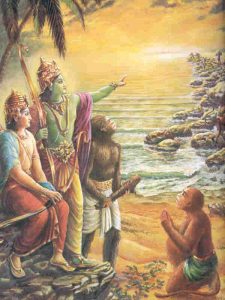 the same Rāma who, unable to make a bridge of arrows over the ocean, employed monkeys to build a bridge of stones? It was only then that His army could cross the ocean. If I had been there then, I would have built such a strong bridge of arrows that the entire army could have easily crossed over.”
the same Rāma who, unable to make a bridge of arrows over the ocean, employed monkeys to build a bridge of stones? It was only then that His army could cross the ocean. If I had been there then, I would have built such a strong bridge of arrows that the entire army could have easily crossed over.”
Hanumān replied very politely, “But your bridge would not have endured the weight of even the weakest monkey in Śrī Rāma’s army.”
Arjuna said, “I am going to make a bridge of arrows over this river, and you may cross it with as heavy a load as you can carry.”
Hanumān then expanded into a huge form and jumped towards the Himālayan mountains. He returned with heavy stones tied to every hair on his body. As soon as he placed one foot on the bridge, it started to quiver, but surprisingly enough, it did not break.
Arjuna trembled in fear. Remembering his worshipable deity, Śrī Kṛṣṇa, he prayed, “O Lord! The honour of the Pāṇḍavas is in Your hands.”
When Hanumān put the full weight of both his feet on the bridge, he was astonished to find that it did not break. If the bridge did not break, it would be a great shame for him. Within his heart, Hanumān remembered his worshipable Lord, Śrī Rāmacandra. Meanwhile, his glance fell below the bridge, where he saw not water flowing but streams of blood. Hanumān immediately jumped off the bridge and peered below it. “Oh! What is this?” he cried. “My worshipable Lord, Śrī Rāmacandra, is personally supporting the bridge of sharp arrows on 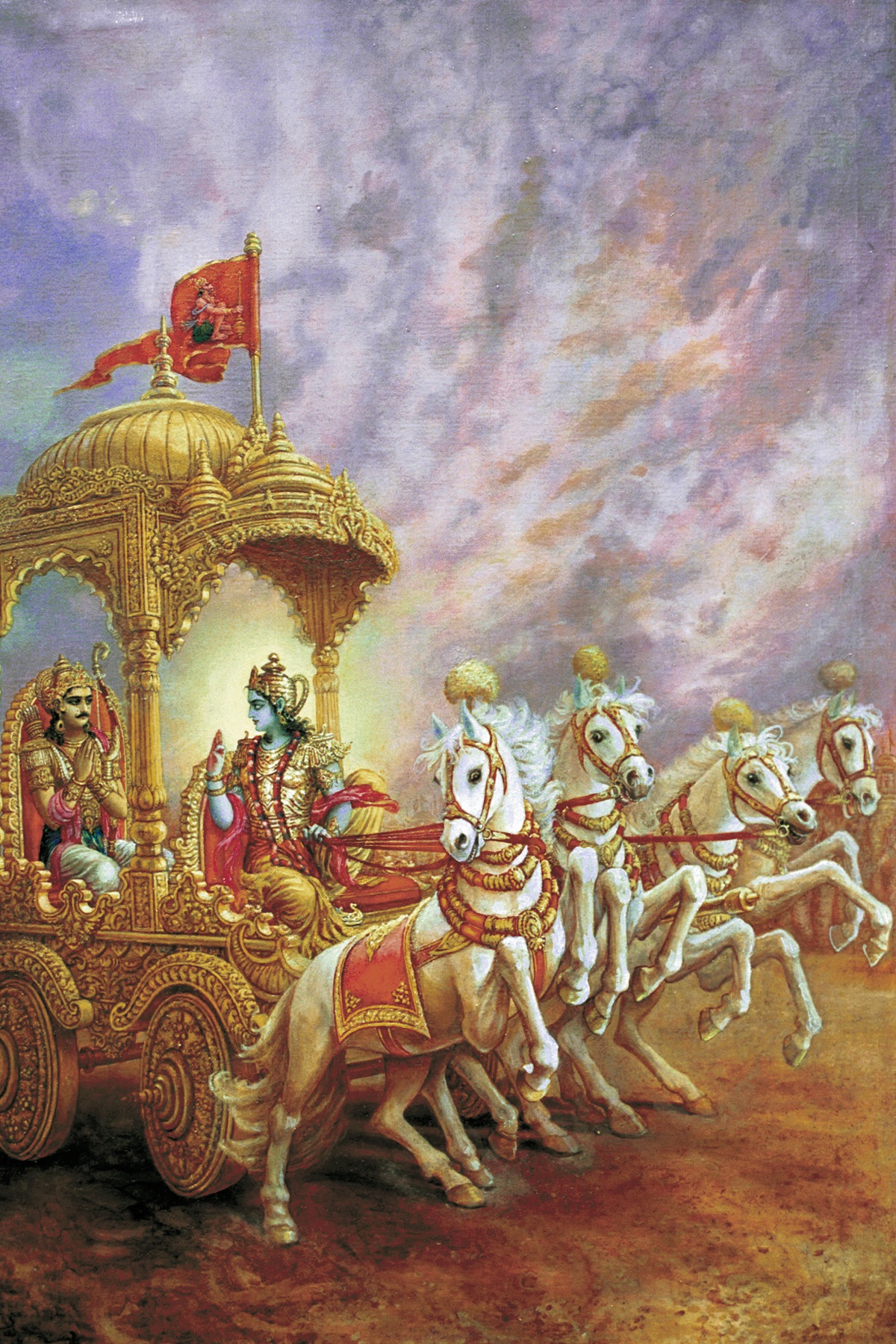 His back!” He at once fell at the lotus feet of Śrī Rāmacandra.
His back!” He at once fell at the lotus feet of Śrī Rāmacandra.
At this same moment, Arjuna saw the Lord not as Śrī Rāma but as Śrī Kṛṣṇa. Hanumān and Arjuna bowed in shame before their worshipable Lord, who said, “There is no difference between these two forms of Mine. I, Kṛṣṇa, in the form of Śrī Rāma, come to establish the limit of morality and proper religious conduct (maryādā). In this very form of līlā-puruṣottama Kṛṣṇa, the Supreme Lord who enjoys transcendental pastimes, I am the personification of the nectar of all rasas. You, both My servants, should become friends from today onward. In a battle soon, the mighty Hanumān, situated on the flag of Arjuna’s chariot, will give him protection in all respects.”
For this reason, Hanumān graced the flag of Arjuna’s chariot in the battle of Mahābhārata. Arjuna thus received the name Kapi-dhvaja, or one who has a monkey on his flag (From Śrīmad Bhagavad-gītā, Chapter 1, Verse 20, Purport by Śrīla Bhaktivedānta Nārāyaṇa Mahārāja).
Source: Purebhakti.com
Image(s) made possible by Pixabay.com, Krishnapath.org and/or Bhaktiart.net
Unless indicated differently, all verse translations and quotes are from the books by Śrīla Prabhupāda (Vedabase.com)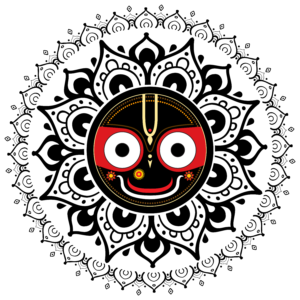
[ad_2]
#Divisions #devotion #House #Bhakti






